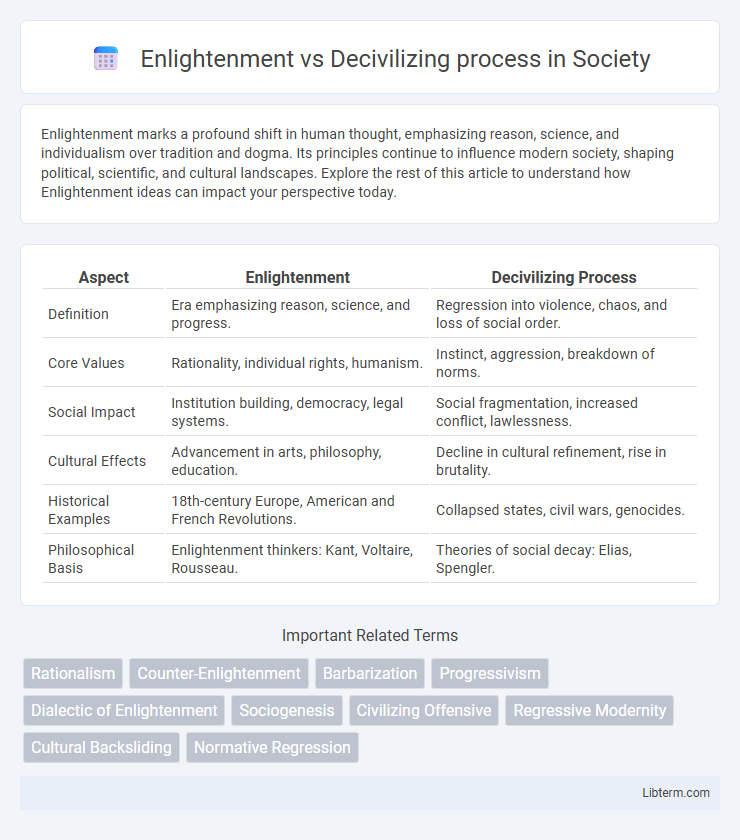Enlightenment marks a profound shift in human thought, emphasizing reason, science, and individualism over tradition and dogma. Its principles continue to influence modern society, shaping political, scientific, and cultural landscapes. Explore the rest of this article to understand how Enlightenment ideas can impact your perspective today.
Table of Comparison
| Aspect | Enlightenment | Decivilizing Process |
|---|---|---|
| Definition | Era emphasizing reason, science, and progress. | Regression into violence, chaos, and loss of social order. |
| Core Values | Rationality, individual rights, humanism. | Instinct, aggression, breakdown of norms. |
| Social Impact | Institution building, democracy, legal systems. | Social fragmentation, increased conflict, lawlessness. |
| Cultural Effects | Advancement in arts, philosophy, education. | Decline in cultural refinement, rise in brutality. |
| Historical Examples | 18th-century Europe, American and French Revolutions. | Collapsed states, civil wars, genocides. |
| Philosophical Basis | Enlightenment thinkers: Kant, Voltaire, Rousseau. | Theories of social decay: Elias, Spengler. |
Understanding Enlightenment: Core Principles
The Enlightenment emphasized reason, individual autonomy, and the pursuit of knowledge as fundamental principles driving societal progress. Central to this intellectual movement were concepts such as liberty, equality, secularism, and scientific inquiry, which challenged traditional authority and superstitions. Understanding Enlightenment requires recognizing its commitment to rationality and human rights as foundations for modern democratic institutions and cultural development.
The Decivilizing Process: An Overview
The Decivilizing Process describes the societal regression marked by the breakdown of social norms, increased violence, and erosion of state control, contrasting the Enlightenment's ideals of progress and rationality. Norbert Elias' theory emphasizes how civilizing processes involve the gradual internalization of self-restraint, while decivilizing shifts lead to impulsive behaviors and social instability. This dynamic highlights the fragile balance within modern societies between order and chaos influenced by historical, political, and psychological factors.
Historical Roots of Enlightenment Thought
Enlightenment thought emerged in the 17th and 18th centuries, rooted in the Renaissance's revival of classical knowledge and the Scientific Revolution's emphasis on reason and empirical evidence. Philosophers like Immanuel Kant and John Locke championed human autonomy, individual rights, and progress through rational inquiry, contrasting sharply with the decivilizing process characterized by social upheaval and breakdowns in political order. The intellectual foundation of the Enlightenment laid the groundwork for modern democratic ideals and the critique of superstition and authoritarianism.
Tracing the Origins of Decivilization
Tracing the origins of decivilization reveals a complex interplay between social, economic, and political factors disrupting established norms of order and progress championed by the Enlightenment. Key contributors include war, environmental degradation, and systemic inequalities eroding institutional stability and collective ethical frameworks. Understanding these forces clarifies the reversal from Enlightenment ideals toward fragmentation and social disorder.
Key Figures Shaping Enlightenment Ideals
Key figures shaping Enlightenment ideals include Voltaire, who championed individual liberty and religious tolerance, and Immanuel Kant, whose philosophy emphasized reason and autonomy as foundations for moral law. John Locke's theories on natural rights and government by consent directly influenced democratic principles, while Jean-Jacques Rousseau advocated for social contract and popular sovereignty. These intellectuals collectively challenged traditional authorities, promoting progress, rationality, and human rights that contrasted with the decivilizing processes marked by social regression and authoritarianism.
Manifestations of Decivilizing Trends in Modern Society
Manifestations of decivilizing trends in modern society include the erosion of social norms, the rise in violent and antisocial behavior, and the breakdown of institutional trust. These trends often correlate with increasing social fragmentation, economic inequality, and disillusionment with political systems. The decivilizing process contrasts sharply with Enlightenment ideals of reason, progress, and structured societal order, highlighting a growing tension between rational governance and chaotic social dynamics.
Enlightenment’s Impact on Social Progress
Enlightenment ideals, emphasizing reason, individual rights, and scientific inquiry, catalyzed significant advancements in social progress by challenging traditional authority and promoting democratic governance. The movement fostered educational reforms, gender equality debates, and the abolition of slavery, laying foundational principles for modern human rights. Its intellectual framework continues to influence contemporary social policies and civil liberties worldwide.
The Societal Consequences of Decivilizing Processes
Decivilizing processes typically lead to the erosion of social norms, increased violence, and weakened institutional authority, undermining societal cohesion and stability. These processes disrupt the progress achieved during the Enlightenment by fostering mistrust, fragmentation, and a decline in collective ethical standards. The resulting societal consequences include heightened conflict, diminished cooperation, and challenges to governance structures essential for maintaining civil order.
Enlightenment vs Decivilization: Comparative Analysis
Enlightenment emphasizes reason, individual rights, and scientific progress as foundational elements of modern civilization, fostering democratic governance and social reforms. In contrast, decivilizing processes involve social fragmentation, erosion of norms, and increased violence, often triggered by crises that undermine institutional stability. Comparative analysis reveals how Enlightenment ideals strive to sustain order and rationality, while decivilization reflects regression towards chaos and cultural disintegration.
Future Perspectives: Pathways Toward Civil Progress
Future perspectives on civil progress emphasize integrating Enlightenment principles of reason, individual rights, and scientific inquiry with adaptive societal frameworks to counteract the decivilizing process marked by social fragmentation and cultural regression. Strategies include fostering inclusive education systems that promote critical thinking, strengthening democratic institutions to uphold human dignity, and leveraging technology for equitable access to resources and information. Embracing sustainable development and cross-cultural dialogue creates resilient communities capable of navigating complex global challenges while advancing collective well-being.
Enlightenment Infographic

 libterm.com
libterm.com